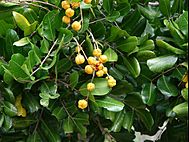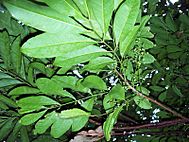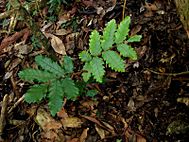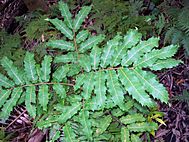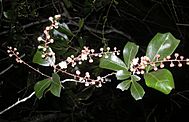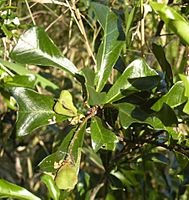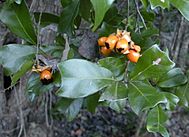Cupaniopsis facts for kids
Quick facts for kids Cupaniopsis |
|
|---|---|
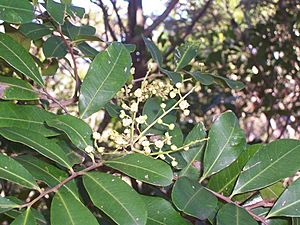 |
|
| Cupaniopsis anacardioides, Tuckeroo, foliage and flowers, Wyrrabalong National Park, NSW, Australia | |
| Scientific classification |
|
| Kingdom: | Plantae |
| Clade: | Tracheophytes |
| Clade: | Angiosperms |
| Clade: | Eudicots |
| Clade: | Rosids |
| Order: | Sapindales |
| Family: | Sapindaceae |
| Subfamily: | Sapindoideae |
| Genus: | Cupaniopsis Radlk. |
| Type species | |
| Cupaniopsis anacardioides (A.Rich.) Radlk.
|
|
| Species | |
|
See text |
|
Cupaniopsis is a genus of about 67 species of trees and shrubs of the soapberry family, Sapindaceae. They grow naturally in New Guinea, New Caledonia, Australia, Torres Strait Islands, Fiji, Samoa, Sulawesi, Micronesia. Many species have been threatened with extinction globally or nationally, with official recognition by the International Union for Conservation of Nature (IUCN) and several national and state governments.
Tuckeroo is a common name suffix for some species in Australia.
C. anacardioides has been introduced into the United States, where in some parts they are invasive plants, primarily in Florida and Hawaii, where the common name Carrotwood applies.
Conservation
At global, national and government regional scales, many Cupaniopsis species have been threatened with extinction, as officially recognised by the International Union for Conservation of Nature (IUCN), governments of Australia, New Caledonia and so on.
Globally, the New Caledonian endemic species C. crassivalvis has become extinct according to the IUCN's 1998 assessment. Seven species endemic to New Caledonia have become endangered with global extinction according to the IUCN's 1998 assessments. Five species endemic to New Guinea, one endemic to New Caledonia and one endemic to Sulawesi have become vulnerable to global extinction according to the IUCN's 1998 and 2010 assessments.
In Australia, C. shirleyana and C. tomentella, small trees endemic to small areas of southeastern Queensland (Qld), have obtained the "vulnerable" species Australian government's national conservation status and together also with C. cooperorum, the Qld government's "vulnerable" species state conservation status. C. newmannii small trees in eastern Qld have obtained the Qld government's "near threatened" species state conservation status. C. serrata small trees in northeastern New South Wales (NSW) have obtained the NSW government's "endangered" species state conservation status.
Naming and classification
European science formally named and described this genus in 1879 using C. anacardioides for the type species, authored by Bavarian botanist Ludwig A. T. Radlkofer.
In 1991 a 190-page monograph of the whole genus was published by Dutch botanist Frits Adema.
Australian botanist Sally T. Reynolds, from 1984 to 1991 published new formal scientific names, descriptions, updates and species clarifications, in her scientific journal articles and the Flora of Australia treatment.
Species
This listing was sourced from the Australian Plant Name Index and Australian Plant Census, the Australian Tropical Rainforest Plants information system, the Census of Vascular Plants of Papua New Guinea, the Checklist of the vascular indigenous Flora of New Caledonia, Flora Malesiana, Fruits of the Australian Tropical Rainforest, "The Endemic Plants of Micronesia", Plants in Samoan Culture, Flora Vitiensis (Fiji), the 2013 Census of the Queensland Flora, the Flora of New South Wales, and the Flora of Australia.
- Cupaniopsis acuticarpa Adema – New Guinea –
 Vulnerable
Vulnerable - Cupaniopsis amoena A.C.Sm. – Fiji endemic
- Cupaniopsis anacardioides (A.Rich.) Radlk., Tuckeroo – NSW, Qld, NT, WA, Australia, New Guinea
- Cupaniopsis apiocarpa Radlk. – New Caledonia endemic
- Cupaniopsis azantha Radlk. – New Caledonia endemic
- Cupaniopsis baileyana Radlk. – NE. NSW, to SE. Qld endemic, Australia
- Cupaniopsis bilocularis Adema – New Guinea
- Cupaniopsis celebica Adema – Sulawesi
- Cupaniopsis chytradenia Radlk. – New Caledonia endemic
- Cupaniopsis concolor (Gillespie) R.W.Ham – Fiji endemic
- Cupaniopsis cooperorum P.I.Forst. – NE. Qld endemic, Australia
- Cupaniopsis crassivalvis Radlk. – New Caledonia endemic –
 Extinct
Extinct - Cupaniopsis curvidens Radlk. – New Guinea
- Cupaniopsis dallachyi S.T.Reynolds – NE. Qld endemic, Australia
- Cupaniopsis diploglottoides Adema – NE. Qld endemic, Australia
- Cupaniopsis flagelliformis (F.M.Bailey) Radlk. – NSW, Qld, Australia
- var. australis S.T.Reynolds – NE. NSW, to SE. Qld endemic, Australia
- var. flagelliformis – Cape York to NE. Qld endemic, Australia
- Cupaniopsis fleckeri S.T.Reynolds – Torres Strait Is., Cape York Peninsula, Qld endemic, Australia
- Cupaniopsis foveolata (F.Muell.) Radlk. – Cape York Peninsula, NE to central E. Qld, endemic, Australia
- Cupaniopsis fruticosa Radlk. – New Caledonia endemic
- Cupaniopsis glabra Adema – New Caledonia endemic –
 Endangered
Endangered - Cupaniopsis globosa Adema – New Caledonia endemic –
 Vulnerable
Vulnerable - Cupaniopsis glomeriflora Radlk. – New Caledonia endemic
- Cupaniopsis grandiflora Adema – New Caledonia endemic
- Cupaniopsis grisea Adema – New Caledonia endemic
- Cupaniopsis guillauminii (Kaneh.) Adema – Chuuk Islands endemic (Micronesia)
- Cupaniopsis hypodermatica Radlk. – New Caledonia endemic
- Cupaniopsis inoplea Radlk. – New Caledonia endemic
- Cupaniopsis kajewskii Merr. & L.M.Perry – New Guinea
- Cupaniopsis leptobotrys (A.Gray) Radlk. – Fiji endemic
- Cupaniopsis mackeeana Adema – New Caledonia endemic
- Cupaniopsis macrocarpa Radlk. – New Caledonia endemic
- var. macrocarpa – New Caledonia endemic
- var. polyphylla – New Caledonia endemic
- Cupaniopsis macropetala Radlk. – New Guinea
- Cupaniopsis megalocarpa Adema – New Caledonia endemic
- Cupaniopsis mouana Guillaumin – New Caledonia endemic –
 Endangered
Endangered
- Cupaniopsis myrmoctona Radlk. – New Caledonia endemic
- Cupaniopsis napaensis Adema – New Guinea –
 Vulnerable
Vulnerable
- Cupaniopsis newmanii S.T.Reynolds – NE. NSW, to SE. Qld endemic, Australia
- Cupaniopsis oedipoda Radlk. – New Caledonia endemic
- Cupaniopsis papillosa P.I.Forst., syn.: C. sp. (Tully Falls) – NE. Qld endemic, Australia
- Cupaniopsis parvifolia (F.M.Bailey) L.A.S.Johnson – NE. NSW, to E. Qld, endemic, Australia
- Cupaniopsis pennelii Guillaumin – New Caledonia endemic
- Cupaniopsis petiolulata Radlk. – New Caledonia endemic
- Cupaniopsis phalacrocarpa Adema – New Caledonia endemic
- Cupaniopsis phanerophlebia Merr. & L.M.Perry – New Guinea –
 Vulnerable
Vulnerable - Cupaniopsis platycarpa Radlk. – New Guinea
- Cupaniopsis rhytidocarpa Adema – New Guinea
- Cupaniopsis rosea Adema – New Caledonia endemic –
 Endangered
Endangered - Cupaniopsis rotundifolia Adema – New Caledonia endemic –
 Endangered
Endangered - Cupaniopsis samoensis Christoph. – Samoa endemic
- Cupaniopsis serrata (F.Muell.) Radlk. – NE. NSW, to SE. Qld endemic, Australia
- Cupaniopsis shirleyana (F.M.Bailey) Radlk. – SE. Qld endemic, Australia
- Cupaniopsis simulata S.T.Reynolds – NE. to SE. Qld, endemic, Australia
- Cupaniopsis squamosa Adema – New Caledonia endemic –
 Endangered
Endangered - Cupaniopsis stenopetala Radlk. – New Guinea, Moluccas
- Cupaniopsis sylvatica Guillaumin – New Caledonia endemic
- Cupaniopsis tomentella (F.Muell. ex Benth.) S.T.Reynolds – SE. Qld endemic, Australia
- Cupaniopsis tontoutensis Guillaumin – New Caledonia endemic –
 Endangered
Endangered
- Cupaniopsis trigonocarpa Radlk. – New Caledonia endemic
- Cupaniopsis vitiensis Radlk. – Fiji endemic
- Cupaniopsis wadsworthii (F.Muell.) Radlk. – NE. to E. central Qld, endemic, Australia
- Species accepted by the official Census of the Queensland Flora 2013, while awaiting formal naming, description and publication
- Cupaniopsis sp. (Biggenden J.Randall 600) – Biggenden and Childers areas, SE. central Queensland
- Cupaniopsis sp. (Watalgan A.R.Bean 8611) – Gladstone region, E. central Queensland
See also
 In Spanish: Tuckeroos para niños
In Spanish: Tuckeroos para niños


